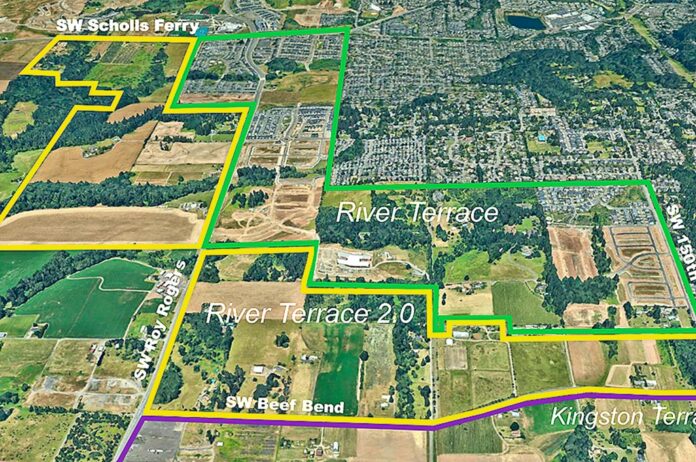Planning for River Terrace 2.0 got a $700,000 boost last month in the form of a Metro 2040 planning and development grant.
The money covers about three-quarters of the projected cost of completing the project’s planning phase, which the city estimates will take about two years.
Tigard acquired the property – 500 acres adjacent to River Terrace between Southwest Scholls Ferry and Southwest Beef Bend Roads near Southwest Roy Rogers Road – in a first-of-its-kind Metro land swap last February that expanded Tigard’s urban growth boundary and accelerated the project’s timeline.
In exchange, two parcels in Clackamas County were subtracted from the UGB, leaving the total amount of developable land unchanged. The Clackamas County land has been inside the UGB for more than two decades but is not ready for development that would create housing and jobs.
“The vision (for River Terrace 2.0) is for a neighborhood that is fully economically integrated with a block-by-block mix of housing types and no exclusionary zoning. There is a strong focus on middle housing and small units with a goal of not just allowing or encouraging these but making them a requirement,” Tigard senior planner Schuyler Warren said to City Council members at a July meeting.
The plan balances housing needs with climate goals by planning for a development with a mix of residential and commercial designed for public transit and other forms of transportation that decrease car travel.
“The vision includes a truly multi-mobile transportation network prioritizing non-motorized travel within the neighborhood to reduce vehicle miles traveled and greenhouse gas emissions,” he said.
It’s a transit-supportive development, meant to create ideal conditions for sustainable, long-term public transit.
“I think we’ve got the right combination of density, destinations, and the transportation network that’s going to make transit sustainable in this area,” he said, addressing a question about the ongoing challenge of increasing TriMet service to and within Tigard.
Total planning costs are about $1 million, $700,000 is provided by the grant, and an estimated $100,000 more will come from a state Department of Land Conservation and Development grant, leaving $150,000 to be funded through other sources.
“We’re exploring federal funding opportunities to narrow the gap,” Warren said.
City Council voted unanimously to accept the Metro grant. Planning is set to begin later this fall and should be completed by early 2026.






















